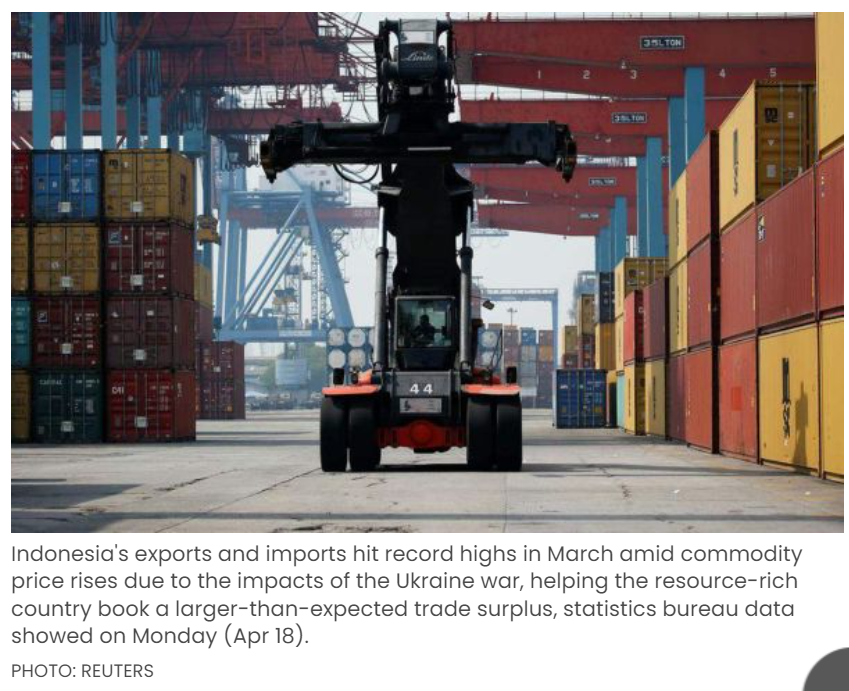Indonesia March exports, imports hit record highs amid commodity boom
Indonesia’s exports and imports hit record highs in March amid commodity price rises due to the impacts of the Ukraine war, helping the resource-rich country book a larger-than-expected trade surplus, statistics bureau data showed on Monday (Apr 18).
March exports from Indonesia were worth US$26.5 billion, up 44.36 per cent on a yearly basis and beating a 23.83 per cent prediction in a Reuters poll.
Imports rose 30.85 per cent to US$21.97 billion, compared to a 18.30 per cent rise seen in the poll.
That gave South-east Asia’s largest economy a US$4.53 billion surplus last month, the largest since October and far greater than the poll’s forecast of a US$2.89 billion surplus.
Prices of Indonesia’s top export products, such as coal, natural gas, palm oil, tin and nickel – which were already high due to recovering demand – surged further in global markets in March following Russia’s invasion of Ukraine. Moscow calls its action a special operation.
“Indonesia is on the right side of the ongoing commodity rally,” said DBS senior economist Radhika Rao, adding its trade surpluses and an improved external position have kept the rupiah relatively stable compared with regional currencies.
Wisnu Wardana, economist with Bank Danamon in Jakarta, revised his projection of 2022 current account deficit to 0.5 per cent of gross domestic product, from 1.9 per cent of GDP due to the surplus.
He said that would help cushion the impact of US monetary tightening measures on Indonesian financial markets.
Among the most dramatic increases were Indonesia’s coal exports, which rose nearly 150 per cent on a yearly basis to US$3.9 billion. By volume, coal shipments were up about 22 per cent annually to 35.3 million tonnes.
On a monthly basis, exports of coal jumped 41 per cent, bought mostly by China, India and the Philippines, although shipments to European countries such as the Netherlands, Italy and Germany also rose, statistics bureau head Margo Yuwono said.
The European Union earlier this month imposed sweeping sanctions on Russia that included banning Russian coal imports from mid-August.
Nickel shipments also registered an annual increase of more than 600 per cent by value to US$569.7 million and an 882 per cent rise by volume to 66,900 tonnes.
However, Indonesia’s palm oil sales slid 1.25 per cent on a yearly basis, despite the price jump, to US$2.4 billion, with a 31 per cent drop in volume to 1.7 million tonnes.
The bureau did not explain the drop. Indonesian authorities restricted exports of the edible oil between late January and mid-March to try to control domestic cooking oil prices.
High commodity prices also affected imports, with Indonesia a net oil importer and a major buyer of wheat and soybean.
The statistics bureau also recorded an increase in imports of meat, fruits and pharmaceutical products, some of which it said may be due to rising demand ahead of the Muslim fasting month of Ramadan, which began in early April. REUTERS


 English
English




